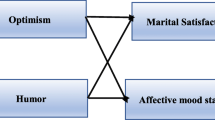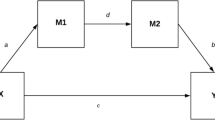Abstract
This study examined spouses' depression and anger, causal attributions for negative marital events, and marital satisfaction in a community sample of 312 newlywed couples. The results showed moderate intercorrelations among these variables for both husbands and wives. Regression analyses showed that spouses' attributions accounted for unique variance in marital satisfaction after controlling for own and partners' affect. Additional findings regarding affect and marital satisfaction were discussed.
Similar content being viewed by others
References
Baucom, D. H., Epstein, N., Sayers, S., & Sher, T. G. (1989). The role of cognition in marital relationships: Definitional, methodological, and conceptual issues.Journal of Consulting and Clinical Psychology, 57 31–38.
Baucom, D. H., Sayers, S., & Duhe, A. (1989). Attributional style and attributional patterns among married couples.Journal of Personality and Social Psychology, 56 596–607.
Beach, S. R. H., Sandeen, E., & O'Leary, K. D. (1990).Depression in marriage: A model for etiology and treatment. New York: Guilford Press.
Bradbury, T. N., & Fincham, F. D. (1990). Attributions in marriage: Review and critique.Psychological Bulletin, 107 3–33.
Cohen, J., & Cohen, P. (1975).Applied multiple regression/correlation analysis for the behavioral sciences. Hillsdale, NJ: Erlbaum.
Coyne, J. C. (1976). Toward an interactional description of depression.Psychiatry, 39 28–40.
Fincham, F. D., Beach, S. R., & Baucom, D. H. (1987). Attribution processes in distressed and nondistressed couples: 4. Self-partner attribution differences.Journal of Personality and Social Psychology, 52 739–748.
Fincham, F. D., Beach, S. R., & Bradbury, T. N. (1989). Marital distress, depression, and attributions: Is the marital distress-attribution association an artifact of depression?Journal of Consulting and Clinical Psychology, 57 768–771.
Fincham, F. D., & Bradbury, T. N. (1988). The impact of attributions in marriage: Empirical and conceptual foundations.British Journal of Clinical Psychology, 27 77–90.
Fincham, F. D., & Bradbury, T. N. (1992). Assessing attributions in marriage: The relationship attribution measure.Journal of Personality and Social Psychology, 62(3), 457–468.
Gotlib, I. H., & Hooley, J. M. (1988). Depression and marital distress: Current status and future directions. In S. Duck (Ed.),Handbook of personal relationships. New York: John Wiley & Sons.
Gottman, J. M., & Krokoff, L. J. (1989). Marital interaction and satisfaction: A longitudinal view.Journal of Consulting and Clinical Psychology, 57 47–52.
Holtzworth-Munroe, A., & Jacobson, N. S. (1985). Causal attributions of married couples: When do they search for causes? What do they conclude when they do?Journal of Personality and Social Psychology, 48 1398–1412.
Hotelling, H. (1940). The selection of variates for use in prediction, with some comments on the general problem of nuisance parameters.Annals of Mathematical Statistics, 11 271–283.
Houston, B. K., & Kelley, K. E. (1989). Hostility in employed women: Relation to work and marital experiences, social support, stress, and anger expression.Personality and Social Psychology Bulletin, 15 175–182.
Lochman, J. E. (1987). Self-and peer perceptions and attributional biases of aggressive and nonaggressive boys in dyadic interactions.Journal of Consulting and Clinical Psychology, 55 404–410.
Locke, H. J., & Wallace, K. M. (1959). Short marital-adjustment prediction tests: Their reliability and validity.Marriage and Family Living, 21 251–255.
Miller, P. C., Lefcourt, H. M., & Ware, E. E. (1983). The construction and development of the Miller Marital Locus of Control Scale.Canadian Journal of Behavioral Science, 15 266–279.
Newman, H. M., & Langer, E. J. (1988). Investigating the development and courses of intimate relationships. In L. Y. Abramson (Ed.),Social cognition inference in clinical psychology (pp. 148–173). New York: Guilford Press.
Patterson, G. R. (1985). A microsocial analysis of anger and irritable behavior. In M. A. Chesney & R. H. Rosenman (Eds.),Anger and hostility in cardiovascular and behavioral disorders (pp. 83–100). Washington, DC: Hemisphere.
Radloff, L. S. (1977). The CES-D Scale: A self-report depression scale for research in the general population.Applied Psychological Measurement, 1 385–401.
Smith, T. W., Pope, M. K., Sanders, J. D., Allred, K. D., & O'Keeffe, J. L. (1988). Cynical hostility at home and work: Psychosocial vulnerability across domains.Journal of Research in Personality, 22 525–548.
Smith, T. W., Sanders, J. D., & Alexander, J. F. (1990). What does the Cook and Medley Hostility Scale measure? Affect, behavior, and attributions in the marital context.Journal of Personality and Social Psychology, 58 699–708.
Spielberger, C. D., Jacobs, G., Russell, S., & Crane, R. S. (1983). Assessment of anger: The State-Trait Anger Scale. In J. N. Butcher & C. D. Spielberger (Eds.),Advances in personality assessment (Vol. 2). Hillsdale, NJ: Erlbaum.
Weiss, R. L., & Heyman, R. E. (1990). Observation of marital interaction. In F. D. Fincham & Thomas N. Bradbury (Eds.),The psychology of marriage: Basic issues and applications (pp. 87–117). New York: Guilford Press.
Author information
Authors and Affiliations
Additional information
This research was supported by a grant (R01 AA07183) from NIAAA to Kenneth E. Leonard. We appreciate the helpful comments of Tom Bradbury and Linda Roberts.
Rights and permissions
About this article
Cite this article
Senchak, M., Leonard, K.E. The role of spouses' depression and anger in the attribution—marital satisfaction relation. Cogn Ther Res 17, 397–409 (1993). https://doi.org/10.1007/BF01177662
Issue Date:
DOI: https://doi.org/10.1007/BF01177662




